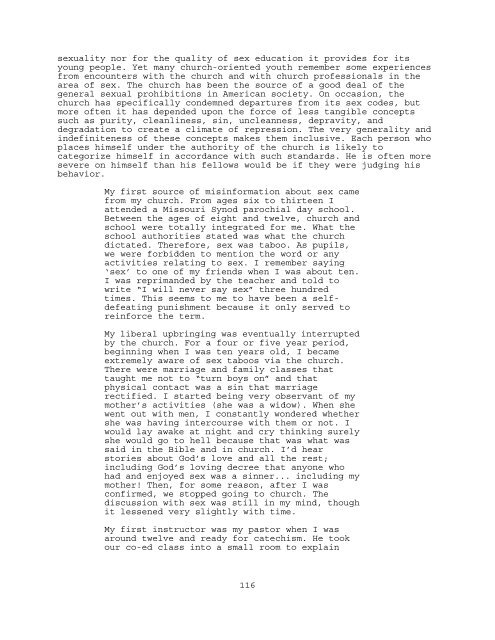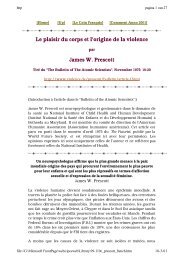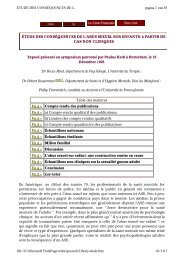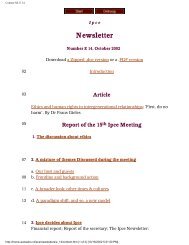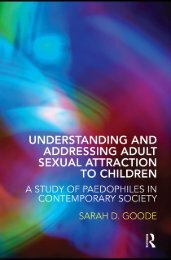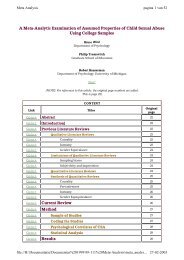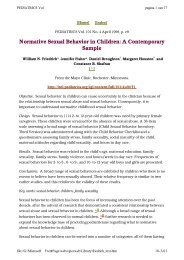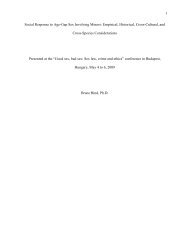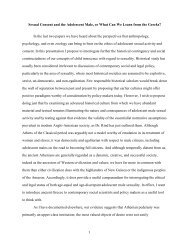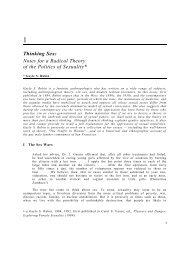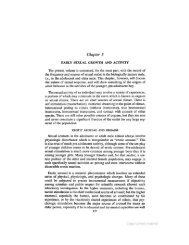Infant and Child Sexuality: A Sociological Perspective - Ipce
Infant and Child Sexuality: A Sociological Perspective - Ipce
Infant and Child Sexuality: A Sociological Perspective - Ipce
Create successful ePaper yourself
Turn your PDF publications into a flip-book with our unique Google optimized e-Paper software.
sexuality nor for the quality of sex education it provides for its<br />
young people. Yet many church-oriented youth remember some experiences<br />
from encounters with the church <strong>and</strong> with church professionals in the<br />
area of sex. The church has been the source of a good deal of the<br />
general sexual prohibitions in American society. On occasion, the<br />
church has specifically condemned departures from its sex codes, but<br />
more often it has depended upon the force of less tangible concepts<br />
such as purity, cleanliness, sin, uncleanness, depravity, <strong>and</strong><br />
degradation to create a climate of repression. The very generality <strong>and</strong><br />
indefiniteness of these concepts makes them inclusive. Each person who<br />
places himself under the authority of the church is likely to<br />
categorize himself in accordance with such st<strong>and</strong>ards. He is often more<br />
severe on himself than his fellows would be if they were judging his<br />
behavior.<br />
My first source of misinformation about sex came<br />
from my church. From ages six to thirteen I<br />
attended a Missouri Synod parochial day school.<br />
Between the ages of eight <strong>and</strong> twelve, church <strong>and</strong><br />
school were totally integrated for me. What the<br />
school authorities stated was what the church<br />
dictated. Therefore, sex was taboo. As pupils,<br />
we were forbidden to mention the word or any<br />
activities relating to sex. I remember saying<br />
‘sex’ to one of my friends when I was about ten.<br />
I was reprim<strong>and</strong>ed by the teacher <strong>and</strong> told to<br />
write “I will never say sex” three hundred<br />
times. This seems to me to have been a selfdefeating<br />
punishment because it only served to<br />
reinforce the term.<br />
My liberal upbringing was eventually interrupted<br />
by the church. For a four or five year period,<br />
beginning when I was ten years old, I became<br />
extremely aware of sex taboos via the church.<br />
There were marriage <strong>and</strong> family classes that<br />
taught me not to “turn boys on” <strong>and</strong> that<br />
physical contact was a sin that marriage<br />
rectified. I started being very observant of my<br />
mother’s activities (she was a widow). When she<br />
went out with men, I constantly wondered whether<br />
she was having intercourse with them or not. I<br />
would lay awake at night <strong>and</strong> cry thinking surely<br />
she would go to hell because that was what was<br />
said in the Bible <strong>and</strong> in church. I’d hear<br />
stories about God’s love <strong>and</strong> all the rest;<br />
including God’s loving decree that anyone who<br />
had <strong>and</strong> enjoyed sex was a sinner... including my<br />
mother! Then, for some reason, after I was<br />
confirmed, we stopped going to church. The<br />
discussion with sex was still in my mind, though<br />
it lessened very slightly with time.<br />
My first instructor was my pastor when I was<br />
around twelve <strong>and</strong> ready for catechism. He took<br />
our co-ed class into a small room to explain<br />
116


